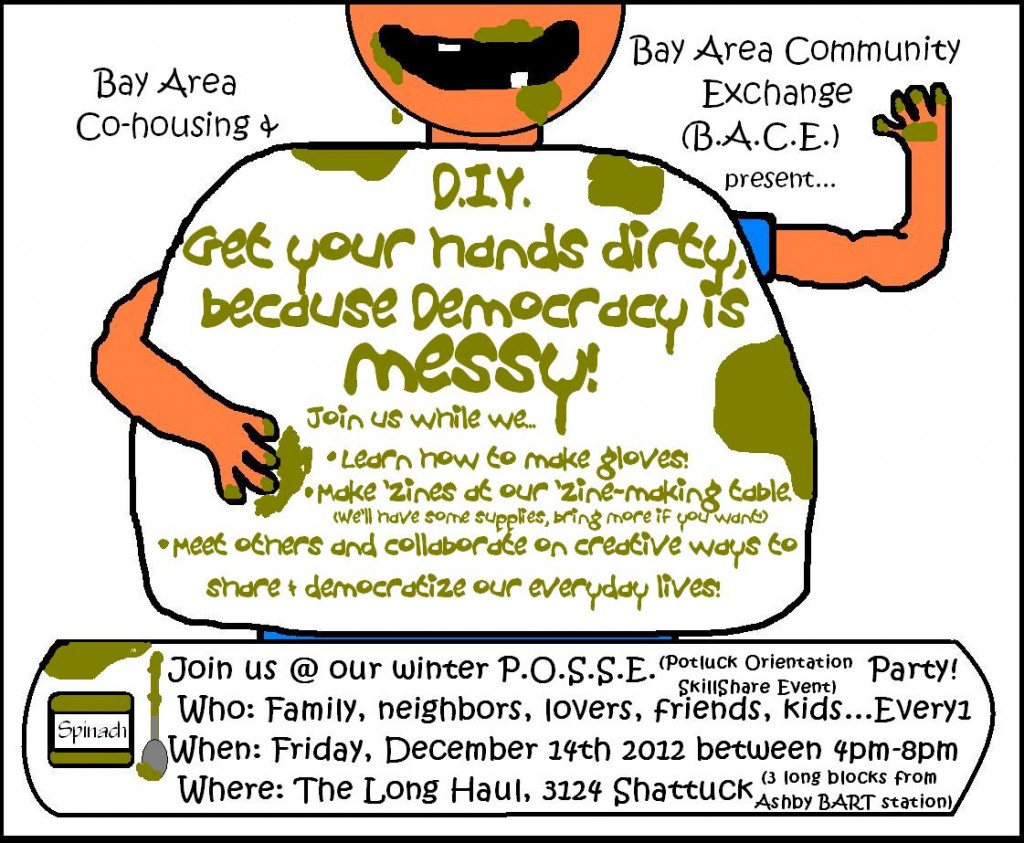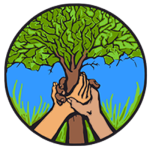In 2009 my relationship with Bay Area Community Exchange began when I made a video about the grassroots (or solidarity) economy. (In fact, you can watch it here!) It earned me about 50 hours on the time bank and I was off and running.
Not only was I ready with hours, I was ready with knowledge that was new to me. Interviewing the organizers of the Grassroots Economics Festival gave me a lot to think about, as far as what is possible outside the mainstream economy.
After becoming a mother, I looked to the time bank for a model to find access to childcare, for one thing. Then I started volunteering with BACE to make sure that the needs of families and kids were considered in planning events, such as POSSE Parties.
My ideas and energy were well-received. It felt great! I’ve worked a lot of jobs where ideas were shot down by bosses who weren’t paying me to think, so they said. BACE is a collective, so that means board members, volunteers, and active time bank users decide what the priorities are. (One challenge with that, of course, is that we often find our long list of ideas limited by our own schedules, resources, and ability to follow through.)
I actively volunteered for over 2 years before nominating myself to become a board member (the standard procedure in joining the board). My hesitance was that as a white lady, joining a board with an already white majority reflected the toxic alignment of power that keeps people of color on the outskirts of not only the mainstream economy but also some “alternative†and supposedly “progressive†movements as well. This remains in the front of my mind.
I also felt that a board, by its very nature, is an elite power structure. Comfortable in staying outside of it, I participated at arm’s-length by doing the work I felt suited for, attending meetings, and exercising my vote. I kept reading about collectives and non-hierarchical organizing structures to learn more. (For example and its counterpoint offered a “second-wave†feminist take on the subject.)
But then the board membership began to shrink, and I saw that my presence was indeed needed—that as a parent, a youth development worker, a feminist, an artist, a skeptic, and a voracious reader of anti-racist analysis, I might be able to make a meaningful impact within and through BACE.
I also saw that whether or not my power was explicitly stated as a board member or implicitly exercised as an extremely active volunteer, it was still power. Naming it and using it responsibly felt better than acting like it was non-existent or somehow not accountable to anyone.
So last month, the attendees of the planning meeting in Oakland went ahead and voted me as a board member. Yay! I’m planning to occupy the seat for 6 months, and during that time I want to hit some goals.
We definitely have our work cut out for us with upcoming website changes, continuing relationships with community organizations, volunteer outreach, and the return of POSSE parties. (Can’t wait for more of those!) We are also working as a board to provide curriculum to use in the community, and trainings for people interested in becoming board members—learning new leadership skills, and sharing theirs with us.
And I would love to talk and work more deeply with people in uprooting structural racism, sexism, ableism, and intersections of oppression, and connecting economic justice work like time banking, for example, to these efforts. What are the benefits of time banking as a solution to inequality? What are the risks? How does it look different in our differing communities? What are the challenges? What other models of mutual aid can we learn from?
Please feel free to email amber@bace.org if you have some thoughts to share, or call me at 415-699-7011. I will do my best to answer in a timely way.
Power, freedom, survival, and consciousness to the people!


